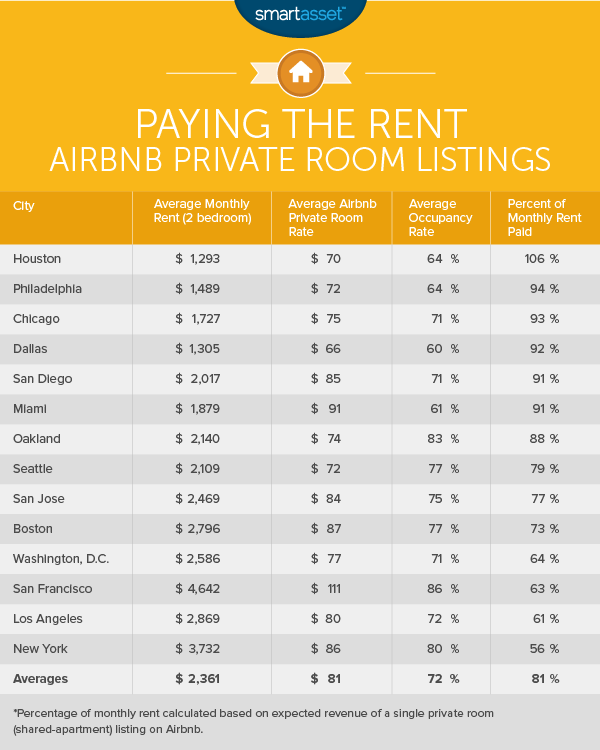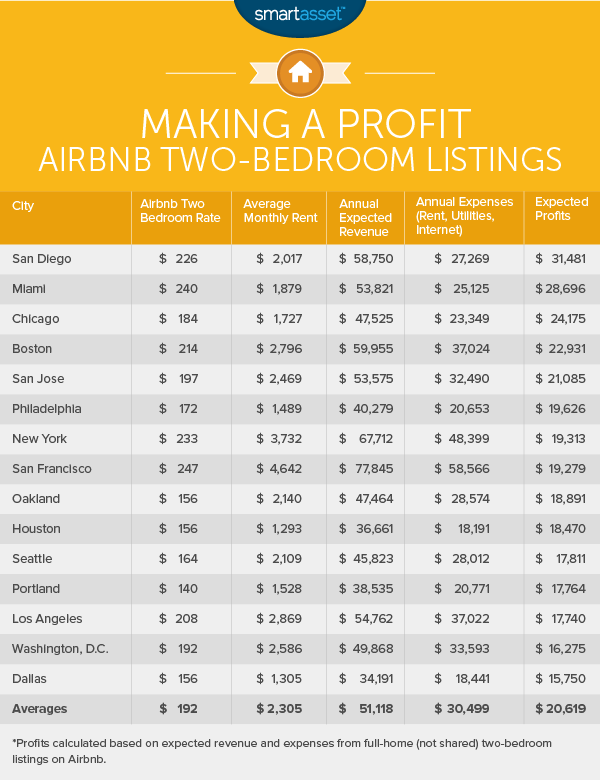On average, Airbnb hosts make around $924 per month. This figure varies depending on the location of the rental, the size of the property, and the number of guests it can accommodate.
Hosts who rent out entire homes tend to earn more than those who rent out a single room. Additionally, hosts who can provide a unique experience or exceptional customer service may receive more bookings and higher rates. Despite the potential for high earnings, it is important for hosts to consider the costs associated with running an Airbnb, such as cleaning fees, maintenance, and taxes.
Overall, becoming an Airbnb host can be a great way to earn extra income, but it requires careful planning and attention to detail to ensure success.

Credit: ippei.com
Contents
- 1 Airbnb Hosting Earnings Breakdown
- 2 Getting Started As An Airbnb Host
- 3 Maximizing Your Airbnb Income
- 4 Occupancy Rates And Revenue
- 5 Operational Expenses For Hosts
- 6 Legal And Tax Considerations
- 7 Real Host Stories And Income Reports
- 8 Tools And Resources For Airbnb Hosts
- 9 Frequently Asked Questions
- 10 Conclusion
Airbnb Hosting Earnings Breakdown
Discover the average monthly earnings for Airbnb hosts and how much they can realistically make. Various factors such as location, property type, and amenities can impact host income. Understanding these variables is crucial for hosts aiming to maximize their earnings.
Are you considering becoming an Airbnb host and wondering how much you can potentially earn? Understanding the average monthly income and the factors that affect earnings can help you make an informed decision. In this section, we will break down the earnings of Airbnb hosts, providing you with valuable insights into the potential financial benefits of hosting.
Average Monthly Income
When it comes to the average monthly income of Airbnb hosts, it can vary depending on various factors such as location, property type, and the number of bookings. On average, Airbnb hosts make around $924 per month. However, it’s important to note that this figure is just an estimate and earnings can fluctuate.
To give you a better idea, here is a breakdown of average monthly income based on property types:
| Property Type | Average Monthly Income |
|---|---|
| Entire Home/Apartment | $1,200 |
| Private Room | $700 |
| Shared Room | $500 |
Keep in mind that these figures are approximate and can vary depending on location and other factors.
Factors Affecting Earnings
Several factors can affect the earnings of Airbnb hosts. Here are some key factors to consider:
- Location: The location of your property plays a significant role in determining your earnings. Properties located in popular tourist destinations or areas with high demand tend to generate higher income.
- Seasonality: The time of the year can also impact your earnings. Peak seasons or holidays often result in higher booking rates and increased income.
- Listing Quality: The quality and attractiveness of your listing can influence your booking rates. High-quality photos, detailed descriptions, and positive reviews can attract more guests and potentially increase your earnings.
- Competitive Pricing: Setting competitive prices for your listing is crucial. Researching similar listings in your area and adjusting your rates accordingly can help you stay competitive and attract more bookings.
- Superhost Status: Airbnb’s Superhost program recognizes hosts who consistently provide exceptional hospitality. Attaining Superhost status can lead to increased visibility and credibility, potentially attracting more guests and boosting your earnings.
By considering these factors and optimizing your listing and hosting strategy, you can maximize your earning potential as an Airbnb host.
In conclusion, the average monthly income of Airbnb hosts is approximately $924, but this can vary depending on factors such as location, property type, and seasonality. Understanding these factors and implementing effective strategies can help you optimize your earnings as an Airbnb host.
Getting Started As An Airbnb Host
Discovering how much you can earn as an Airbnb host depends on several factors, including location, type of property, and competition. On average, hosts in the United States earn around $924 per month, but this can vary significantly based on the above factors.
It’s best to research the market in your area and set competitive rates to maximize your earnings potential.
Initial Setup Costs
Setting up an Airbnb listing involves initial expenses.
Creating An Appealing Listing
To attract guests, focus on creating an appealing listing.
Maximizing Your Airbnb Income
When it comes to maximizing your Airbnb income, there are several strategies that hosts can implement to boost their earnings. By focusing on strategic pricing and improving guest experience, hosts can significantly increase their monthly earnings. Let’s explore these strategies in more detail.
Strategic Pricing
Strategic pricing is crucial for maximizing your Airbnb income. By conducting thorough market research and analyzing demand and supply trends in your area, you can set competitive pricing that attracts guests while maximizing your earnings.
Improving Guest Experience
Enhancing the guest experience is key to generating positive reviews and securing repeat bookings. By providing exceptional hospitality, maintaining a clean and well-equipped property, and offering personalized touches, hosts can create memorable experiences for guests, leading to higher occupancy rates and increased earnings.
Occupancy Rates And Revenue
Discover the correlation between high occupancy rates and increased revenue for Airbnb hosts. Learn about the average monthly earnings potential for Airbnb hosts in various locations. Explore the factors influencing host income levels and strategies for maximizing profits in the short-term rental market.
Seasonal Variations
Airbnb hosts experience seasonal variations in occupancy rates and revenue, which directly impact their earnings. During peak seasons, such as holidays or local events, hosts can expect higher occupancy rates and increased revenue.
Understanding Market Demand
Hosts need to closely monitor market demand to optimize their occupancy rates and revenue. By adjusting pricing strategies based on demand fluctuations, hosts can maximize their earnings throughout the year.
Operational Expenses For Hosts
Airbnb hosts’ average monthly earnings can vary based on location, property type, and occupancy rates. However, hosts must consider operational expenses such as cleaning fees, maintenance, and utilities, which can impact their overall income. Successful hosts focus on maximizing occupancy and providing an exceptional guest experience to enhance their profitability.
Operational Expenses for HostsAs an Airbnb host, it’s important to understand the operational expenses that come with running your rental property. These expenses can significantly impact your overall earnings, so it’s important to budget accordingly.Regular Maintenance CostsOne of the biggest operational expenses for hosts is regular maintenance costs. This includes things like cleaning supplies, linens, and toiletries for guests. Depending on the size of your property and the number of guests you host, these costs can add up quickly.To minimize these costs, some hosts choose to provide only the essentials and require guests to bring their own linens and toiletries. However, this can negatively impact your guest experience and lead to lower ratings and fewer bookings.Unexpected ExpensesAnother operational expense that hosts must consider is unexpected expenses. These can include repairs for damages caused by guests, emergency repairs for broken appliances or HVAC systems, and even legal fees for disputes with guests.To prepare for these expenses, hosts should set aside a portion of their earnings each month for a rainy day fund. This will ensure that you have the necessary funds to cover unexpected expenses without impacting your overall earnings.In addition to these operational expenses, hosts must also consider the cost of utilities, insurance, and taxes. By carefully budgeting for these expenses and setting realistic expectations for your earnings, you can successfully run a profitable Airbnb rental property.
Credit: smartasset.com
Legal And Tax Considerations
Considerations for Airbnb hosts include understanding legal and tax implications to maximize monthly earnings. It’s crucial to comply with regulations and plan for tax obligations to ensure profitability and avoid potential issues in the long run. Proper documentation and financial planning are key for sustainable income growth.
Local Regulations
Airbnb hosts need to be aware of local regulations that may affect their ability to rent out their properties. In some areas, there may be zoning laws or homeowners’ association rules that restrict short-term rentals. Hosts should research and comply with these regulations to avoid legal issues.
Tax Implications And Deductions
When it comes to taxes, Airbnb income is generally considered taxable. Hosts should keep detailed records of their rental income and expenses to accurately report their earnings. Additionally, hosts may be eligible for tax deductions related to their Airbnb activities, such as property maintenance, utilities, and cleaning fees.
Real Host Stories And Income Reports
Success Stories
- Host in Austin, Texas earns $2,500 per month
- Superhost in Los Angeles makes $4,000 monthly
- Retired couple in Florida generates $3,000 monthly
Challenges Faced By Hosts
- Dealing with difficult guests
- Maintaining property cleanliness
- Managing fluctuating demand
Tools And Resources For Airbnb Hosts
When it comes to maximizing earnings as an Airbnb host, utilizing the right tools and resources is essential. These resources can help hosts analyze their income, track performance, and make data-driven decisions to optimize their listings.
Income Calculators
Income calculators are valuable tools for Airbnb hosts to estimate their potential earnings based on various factors such as location, property type, and occupancy rates. These calculators provide insights into the expected monthly revenue, allowing hosts to set competitive pricing strategies.
Analytics And Tracking
Analytics and tracking tools offer hosts detailed insights into their performance metrics, including booking rates, average daily rates, and occupancy levels. By analyzing this data, hosts can identify trends, understand guest preferences, and make informed decisions to enhance their listings.

Credit: smartasset.com
Frequently Asked Questions
How Much Do Airbnb Owners Make Monthly?
On average, Airbnb owners make around $500 to $1,500 per month. However, the income can vary depending on factors such as location, property type, and occupancy rate. It’s important to note that this is just an estimate and individual earnings may differ.
How Much Can You Realistically Make With Airbnb?
On average, Airbnb hosts can realistically make a significant income. However, the exact amount varies based on factors such as location, property type, and availability. It is best to research your specific area and property to determine the potential earnings.
What Is A Good Airbnb Income?
A good Airbnb income can vary, but hosts often make around 3% of the property value.
How Much Do Airbnb Hosts Get?
On average, Airbnb hosts make around 3% of the total booking cost. However, the actual amount varies depending on factors such as location, type of property, and seasonality. Some hosts can make a significant income, while others may only earn a modest amount.
It’s important to research and understand the local market and set competitive prices to maximize earnings.
Conclusion
Airbnb hosts have the potential to earn a substantial monthly income. Factors such as location, property type, and hospitality can impact earnings. By providing a positive guest experience and optimizing listing visibility, hosts can maximize their profitability. Utilizing data-driven strategies and understanding market trends can further enhance income potential.



